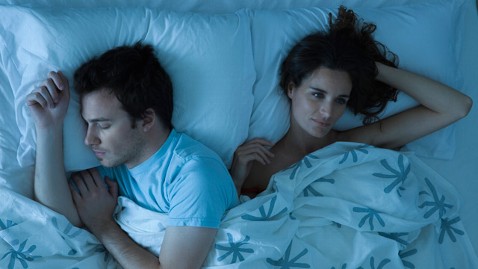Sleep and Couples: For Better or Worse, Day AND Night?

Image credit: Getty Images
By Wendy Troxel
Sleep. It occupies about one-third of our lives. We need it for our mental and physical health, and for our survival.
Compared with other health behaviors such as smoking or exercise, sleep is unique because for most adults, it is a behavior they "share" with a partner. But according to studies funded by the National Institutes of Health and the American Psychological Association, sharing a bed doesn't always produce sweet dreams.
Research by me and my colleagues at the University of Pittsburgh found that for men, poor sleep predicts more negative interactions with his partner the next day. For women, the converse was true: How she interacts with her partner during the day predicts how soundly she sleeps at night. In other words, for women, marital strife can lead to a sleepless night; for men, a sleepless night can lead to marital strife. Taken together, these interactions can create a vicious cycle, potentially increasingly poor sleep and distressed relationships.
Despite the fact that most adults share their bed with a partner, and that sleep problems and relationship problems co-occur, only a handful of studies have investigated how sleeping together affects the sleep of both partners.
Evidence from these studies suggests that there may be costs to sharing a bed with a partner. That is, on nights when couples sleep together, they tend to have more fragmented or restless sleep than nights when they sleep alone. Some evidence suggests that these consequences are stronger for women. On the other hand, people generally prefer to sleep with a partner and believe that they sleep better when sharing a bed.
So why do we prefer to share our beds when, at least by objective measures, we tend to sleep better alone? Looking to our evolutionary past may help answer this question.
Sleep is a universal and essential health behavior, but it is also extraordinarily dangerous from an evolutionary perspective. Think about it: Sleep occurs while a person is lying down, in a semi-conscious state, and highly vulnerable to potential threats from the environment. But it is nearly impossible to fall asleep if you are feeling unsafe or insecure.
Humans are inherently social beings, and we derive a sense of safety and security from our social environment. This fundamental need for safety and security at night may explain why we generally prefer to sleep with another human being, even when sharing a bed may not always result in the best quality sleep.
Humans may no longer depend on sharing a bed to protect them from harm in the hostile environment of our evolutionary past. But focusing on the potentially adverse consequences of sleeping with another may obscure the importance of stable, good-quality relationships for healthy sleep.
For example, some research has indicated that women in stable, long-term relationships have better quality sleep than their unpartnered counterparts, and women who are in highly satisfying relationships have lower rates of insomnia than those in distressed relationships.
Should couples sleep together or sleep apart? The answer may be … it depends.
There is no one-size-fits-all approach. Couples need to decide what works best for them and consider how to optimize their sleep as well as their time together so that they can be the best possible partner for their loved one.
Ultimately, the time couples spend together before falling asleep may be the most important time for connecting, being intimate and just being "alone together" without all of the other distractions of the day. Whether couples sleep in the same bed or separate beds, they need not give up on that important and satisfying pre-sleep time together. Perhaps the real benefits of "sleeping together" are realized in the precious lull before sleep comes.
Wendy Troxel is a clinical psychologist and behavioral scientist at the nonprofit, nonpartisan RAND Corporation and an adjunct assistant professor at the University of Pittsburgh, Departments of Psychiatry and Psychology.